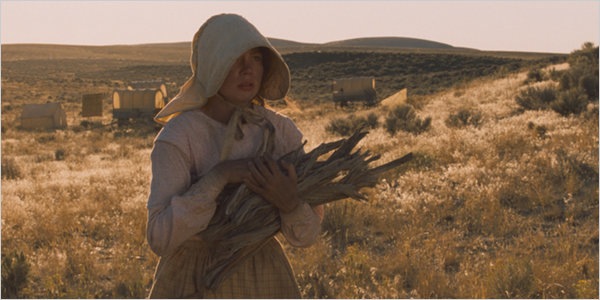 Last week’s screening of Submarine gave us a healthy dose of life lessons, delivered with the dry, awkward wit of young Oliver Tate. Oliver’s world is small, insular, still relatively innocent—or so, it is, until that world begins to unravel. We are invited to watch as he fumbles through losing his virginity and falling for his first love—a romance that is offset by his parents’ own troubled relationship. How are we supposed to learn about love when our father is a detached, depressive shut-in and our mother, bored and unsatisfied, goes looking for release, spiritual or otherwise, with the psychic/psycho ninja ex-lover who is living next door?
Last week’s screening of Submarine gave us a healthy dose of life lessons, delivered with the dry, awkward wit of young Oliver Tate. Oliver’s world is small, insular, still relatively innocent—or so, it is, until that world begins to unravel. We are invited to watch as he fumbles through losing his virginity and falling for his first love—a romance that is offset by his parents’ own troubled relationship. How are we supposed to learn about love when our father is a detached, depressive shut-in and our mother, bored and unsatisfied, goes looking for release, spiritual or otherwise, with the psychic/psycho ninja ex-lover who is living next door?
There are no easy answers, Oliver must learn. And we are all cosmically bound to make colossal mistakes. And we are all promised broken hearts and second chances, mostly. We are all lost and insignificant. We are all the same.
Submarine delves into the simplest and most complex moments of our emotional lives, but it doesn’t mean to leave us there to drown. Oliver is often found at the shore, gazing out over the sea, dipping his toes in as if it might swallow him. He stands at the edge of an apocalypse that is never coming. If we follow him here, completely, we can take some comfort in that. We are not drowning: it only feels that way.
(Did you plumb new depths with Submarine? Rate the film here!)
From one end of the world to another, this week the Cape Breton Island Film Series presents Meek’s Cutoff, a film set in the extremely wild American West, where the threat of annihilation is very real, and where being lost is a literal danger, rather than an emotional metaphor.
You might remember director Kelly Reichardt from her 2008 CBIFS pick, Wendy & Lucy. The film stars (almost exclusively) Michelle Williams, her broke down car, and her missing dog; and if you’ve seen it, you know that Reichardt likes to take her time, speak with silence, and leave the conclusions almost entirely to us. She is a poet. And if too many of us have stopped reading poetry since the invention of shiny screens and flashing lights, Reichardt’s film may give us the chance to learn something important: how to listen.
Oh, don’t let that scare you. Sure it might hurt a little. Perhaps this film will be “painfully” slow as it trudges through the vast, untouched deserts of the Oregon Trail. But so what? How hard could it be? And are we so afraid of a challenge? As Meek’s Cutoff‘s weary travelers suffer the deep, unsettling threat of the unknown, do they complain at the pace of their oxen? Do their children call out “Are we there yet?” from the back of the carriage? Of course not. They just sit there and try not to eat each other. Now there’s a lesson we could all learn.
So, now that we are settled, or at least, comfortably unsettled, let’s get to know our company. The story follows three families, with few possessions, heading West on the high desert, towards the hope of a new settlement. They are led by the suspicious Stephen Meek (Bruce Greenwood), a real-life frontiersman who led 200 wagons that saw 23 casualties in 1845 before they reached the creek. In this pared down account, true to Reichardt’s reductionist touch, just three families travel with Meek: the considerate Tetherows, the immature Gatelys, and the devout Whites.
Michelle Williams reunites with Reichardt here, playing Emily Tetherow—the heart and, we suspect also the head, of this traveling band. Tetherow is a careful, thoughtful, and calming presence throughout the film. With the support of her husband (of course!) she challenges the blowhard Meek, and is the most open to the guidance of the “Indian” they meet along the way.
Unsentimental and uncertain, the film moves along with the same determination as Williams’ character. Reichardt explores the beautifully treacherous landscape, and negotiates the contradictions that this world creates. Moving between wide shots that reveal the immensity of the desert and narrow frames that capture the frustrated hopes of its travelers, she suggests a dark playfulness that echoes from the film’s murky soul.
This film, then, should not be easy. We have earned no such luxury. But we too are willful, and determined. We are strong enough to see it through.
Reading poetry is a task that requires patience, reflection, and pause. One must listen when there is nothing being said. It is often the silence that moves us most, and the stillness that unsettles us. As we prepare to journey into Meek’s Cutoff, we abandon the expectation that we will ever arrive. Yet even as the characters forge ahead, clinging desperately to hope, we are asked to swallow our own thoughts of despair. This is, after all, a story of survival. It is hope that keeps us moving. It is hope that keeps us alive.
And so we listen, when no one is speaking, and we hope to hear something beautiful.
Meek’s Cutoff plays tomorrow night, 7pm, at Empire Theatres Studio 10.

